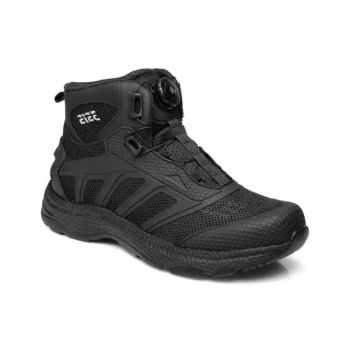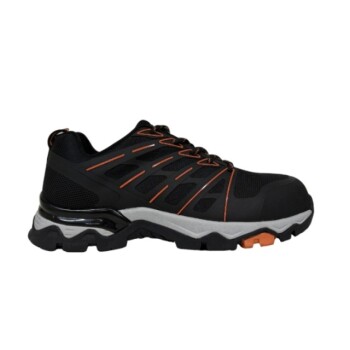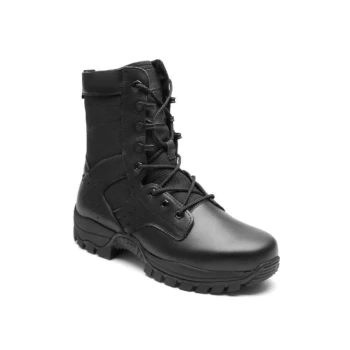In short, the primary advantages of lightweight hiking shoes are significantly reduced fatigue, immediate out-of-the-box comfort, and superior breathability. They allow you to move more naturally and with greater agility on the trail, which often leads to a more enjoyable and less strenuous hiking experience.
Choosing footwear is a strategic decision about energy management. Lightweight hiking shoes excel by minimizing the energy you expend with every step, trading the absolute protection of traditional boots for significant gains in comfort and efficiency on most modern trails.
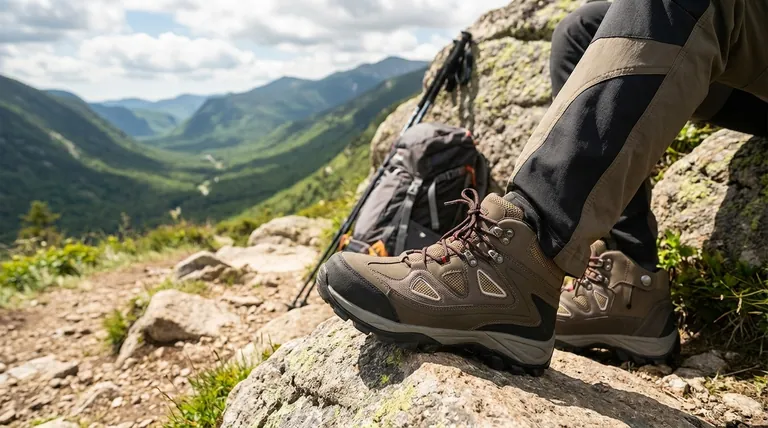
The Core Benefits of Going Lightweight
The decision to move away from heavy, rigid boots toward lighter footwear is one of the most significant shifts in modern hiking. This change is driven by a clear understanding of biomechanics and comfort.
Reduced Fatigue and Energy Savings
Weight on your feet is far more taxing than weight on your back. Lighter shoes require less muscular effort to lift with each step, which translates directly into saved energy over the course of a hike. This allows you to cover more ground with less fatigue.
Immediate Comfort and Flexibility
Unlike stiff leather boots that require a lengthy break-in period, lightweight hiking shoes are typically comfortable right out of the box. Their flexible midsoles allow your foot to move naturally, which can improve your balance and connection to the trail surface.
Superior Breathability and Foot Health
Lightweight shoes almost always offer better breathability than their heavier counterparts. Increased airflow helps moisture from sweat escape, keeping your feet drier. This is critical for preventing skin issues and, most importantly, the blisters that are often caused by friction on damp skin.
Faster Drying Times
When you encounter an unexpected stream crossing or downpour, lightweight synthetic shoes will dry significantly faster than bulky leather boots. This enhances comfort and reduces the risk of foot problems on multi-day trips.
Understanding the Trade-offs
While the benefits are compelling, lightweight shoes are not a universal solution. Their advantages come with specific trade-offs that you must consider based on the terrain and your personal needs.
Reduced Ankle Support
This is the most significant compromise. The low-cut design of a shoe offers minimal protection against rolled ankles. This makes them better suited for hikers with strong, flexible ankles or for use on well-maintained, less-technical trails.
Less Protection from Terrain
The flexible soles that make lightweight shoes comfortable also offer less protection from sharp rocks, roots, and other underfoot hazards. A stiff boot provides a more rigid platform, shielding your foot from these impacts.
Limited Suitability for Heavy Loads
If you are carrying a heavy backpack (e.g., over 30 lbs), the stability and stiff support of a traditional hiking boot are often essential. A boot's rigid structure helps manage the load and reduces stress on your feet and ankles.
Durability Considerations
While a quality hiking shoe is built to last (often around 800 miles), it will generally not have the multi-year lifespan of a heavy-duty, full-grain leather boot. The lighter materials are simply less resistant to long-term abrasion.
Making the Right Choice for Your Hike
Your footwear should be a deliberate choice based on your specific objective. There is no single "best" option, only the best tool for the job at hand.
- If your primary focus is day hiking on established trails: Lightweight hiking shoes are almost certainly your best choice for optimal comfort and energy efficiency.
- If your primary focus is ultralight backpacking with a light pack: These shoes are an excellent option, providing sufficient support without unnecessary weight.
- If your primary focus is carrying heavy loads or traversing rugged, off-trail terrain: The support and protection of a traditional hiking boot are paramount for safety and stability.
- If your primary focus is moving as fast as possible: You might even consider trail-running shoes, which sacrifice some durability for even less weight and more agility.
Ultimately, choosing the right footwear is about correctly matching its design to the demands of your hike.
Summary Table:
| Advantage | Key Benefit |
|---|---|
| Reduced Fatigue | Saves energy with every step, letting you hike longer. |
| Immediate Comfort | Flexible design, comfortable right out of the box. |
| Superior Breathability | Keeps feet drier, preventing blisters and skin issues. |
| Faster Drying | Synthetic materials dry quickly after stream crossings or rain. |
| Trade-off: Ankle Support | Low-cut design offers less protection against rolled ankles. |
| Trade-off: Load Support | Less suitable for carrying heavy packs (over 30 lbs). |
Ready to equip your customers with the perfect hiking footwear?
As a large-scale manufacturer, 3515 produces a comprehensive range of high-quality hiking shoes and boots for distributors, brand owners, and bulk clients. Whether your market demands lightweight agility or rugged support for heavy loads, our production capabilities deliver the right footwear for every trail.
Contact us today to discuss your specific needs and discover how we can enhance your product line.
Visual Guide
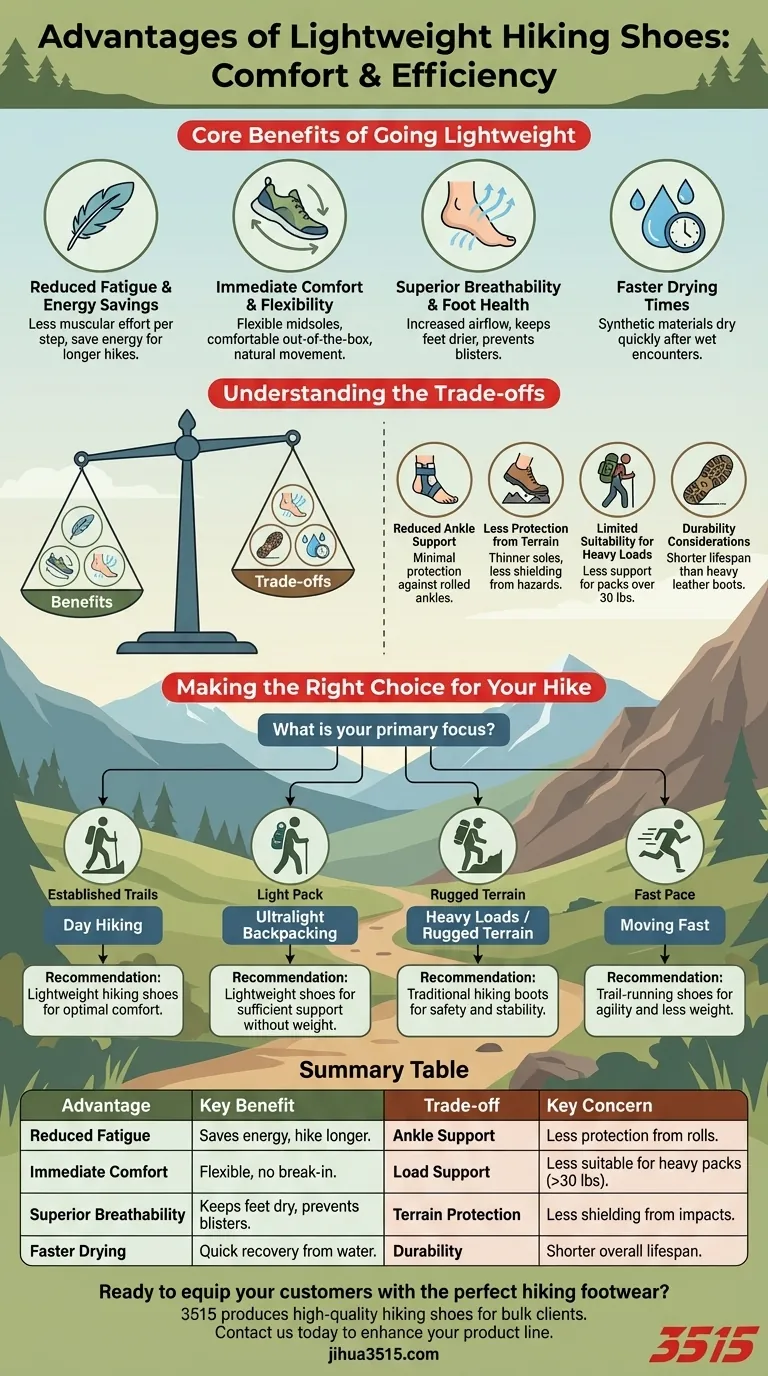
Related Products
- Safety Footwear Wholesale Manufacturer for Custom OEM/ODM Production
- Wholesale Lightweight Tactical Boots with Dial Closure OEM & Bulk Orders
- Factory Direct Wholesale Rain Boots Durable Waterproof & Fully Customizable
- Premium KPU Injection Athletic Style Safety Shoes
- High Performance Fire-Retardant Waterproof Safety Boots
People Also Ask
- Is it normal to wear shoes in the house? A Guide to Hygiene, Comfort & Culture
- What cultural and environmental considerations are tied to wearing shoes indoors? Balance Hygiene, Tradition, and Foot Health
- Is safety-toe as good as steel toe? Choose the Right Protection for Your Job
- What are the differences between steel toe, composite toe, and alloy toe Wellington boots? Choose the Right Safety Toe for Your Job
- How do safety shoes contribute to cost savings for companies? A Strategic Investment in Risk and Cost Management

